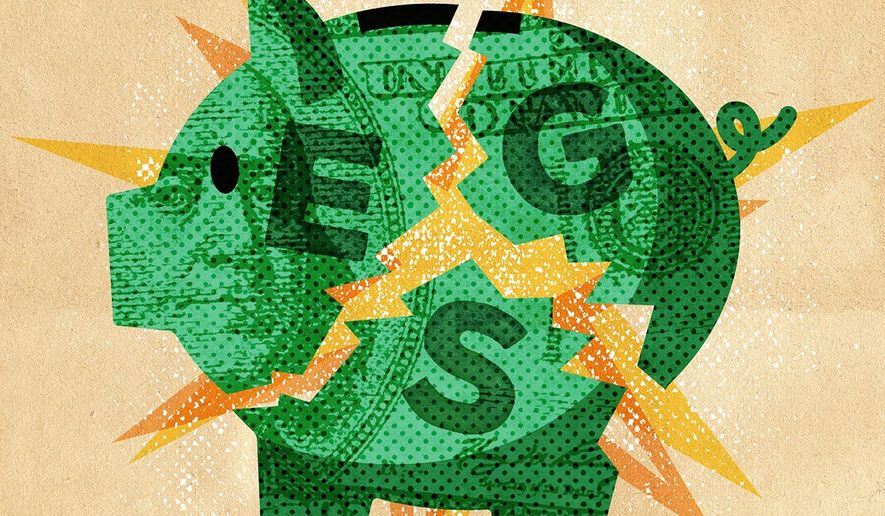OPINION:
Businesses are told to “measure what matters.” Increasingly, what matters to businesses today are environmental, social and governance criteria — known by the ubiquitous acronym ESG. As a general rule, businesses should be good stewards of natural resources, treat customers and employees fairly, and govern themselves effectively. But those ethical standards are distinct from the comprehensive and ideologically driven demands of ESG.
At its core, ESG requires businesses to choose sides in contentious political debates. That’s why more and more businesses are implementing policies that align with an illiberal “woke” agenda on issues ranging from climate change to gender identity to abortion. And at the vanguard of this relentless push for ESG orthodoxy are elite financial institutions.
Three years ago, 181 CEOs signed the Business Roundtable’s Statement on Corporate Governance “modernizing” the role of the corporation to include commitments to ESG. The statement observed that prior commitments by corporations to serve “shareholders” failed to “accurately describe” the need for corporations to serve “stakeholders” by pursuing ESG goals. Signatories included the leaders of PayPal, BlackRock, Vanguard, State Street, BNY Mellon, J.P. Morgan and Goldman Sachs.
Today, only three years after the statement was signed, nearly one-third of all managed assets are subject to ESG criteria, and this market share is only increasing. This gives those in the financial industry powerful levers to tilt corporations in their preferred political direction. Financial institutions already have used that newfound political power against the firearm and fossil fuel industries, just to name two.
This practice of denying financial services to disfavored businesses, or “debanking,” is now being applied to those holding any number of momentarily unfashionable viewpoints. PayPal recently announced a sweeping policy that would empower it to levy fines of $2,500 per offense for users who advance “misinformation” or jeopardize the “well-being” of other users. PayPal later walked back its proposed penalty for misinformation but continues to threaten fines for “hate” or “intolerance.”
Those vague and ill-defined categories provide ample room for mischief. In fact, JPMorgan Chase leveraged similar terms earlier this year to debank conservative groups Defenders of Liberty and National Committee for Religious Freedom.
The potential for abuse is plainly evident when one looks at the evolving uses for ESG ratings.
For instance, in the wake of the Supreme Court’s decision in Dobbs v. Jackson Women’s Health Organization overturning Roe v. Wade, ESG advocates are pushing companies to wade into the political thicket of abortion politics by prioritizing employee benefits and political spending that facilitate abortion as part of their ESG program.
And perhaps most alarming, ESG is now being proposed as a tool to evaluate individual borrowers and investors. According to Diginex, an ESG advisory firm, a personal ESG score “works like a credit score,” marking a person with an inadequate ESG score as one who “cannot be entrusted with a task that requires a high focus on responsibility.” “Therefore, only the person with a high personal ESG score gets the opportunity for employment, partnership, or investment, among other corporate opportunities.”
The use of ESG in this way threatens to implement in America through the private sector what China has implemented via its state-created “social credit system.” This use of ESG credit scores threatens to implement through corporate and financial totalitarianism what the illiberal far-left activists have not been able to achieve through the traditional levers of government power.
The financial community is not monolithic, however, in its support for ESG-driven decision-making.
Recently, a leading group of CEOs, executives and professionals in the American financial sector signed the “Statement on Debanking and Free Speech.” The statement calls on executives within America’s leading banks and financial institutions to make concrete changes to their policies that will eliminate viewpoint-based discrimination from banking and financial services.
The statement also calls on these executives to participate in the survey portion of the Viewpoint Diversity Score Business Index, which creates transparency and provides shareholders, executives, and the public with needed information about where these companies stand on respecting religious and viewpoint diversity.
Raising awareness about the pernicious impact of ESG is a necessary first step to ensure that Americans are not excluded from the marketplace because of their political views. Many Americans are unaware that their ability to access credit, obtain investment, or even secure employment may be dependent upon whether they are sufficiently “woke” in the view of ESG activists. Moreover, companies truly committed to good corporate governance and social responsibility should welcome the transparency that tools like the Viewpoint Diversity Index provides.
ESG has taken the corporate and financial sectors by storm largely because it has operated in the shadows. The continued viability of the free market requires that ESG be brought into the light and critically examined for its compatibility with core American values like freedom of speech, conscience and opportunity. On this score, the signers of the Statement on Debanking have done us all a great service.
• Ryan Bangert is senior vice president of strategic initiatives and special counsel to the president for Alliance Defending Freedom (@ADFLegal).




Please read our comment policy before commenting.